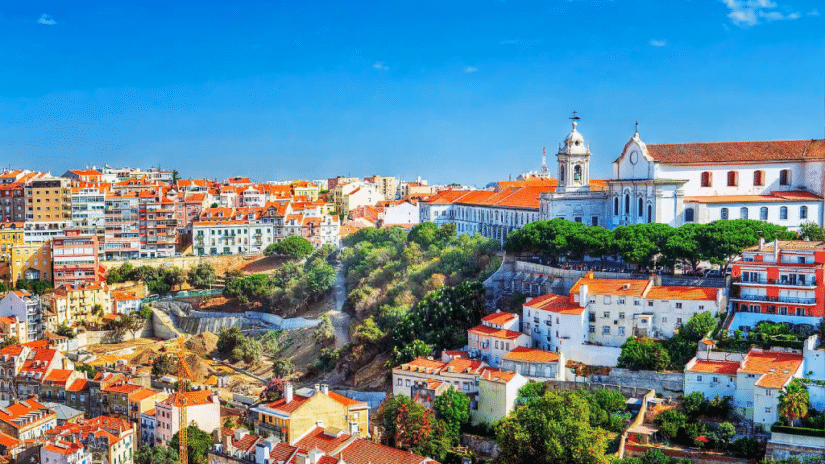What Happens After 10 Years of NHR in Portugal?
For most global citizens wishing to move to Portugal or already living in Portugal, it is a common question.
What happens after living in Portugal for ten years under the Non-Habitual Resident Tax Regime?
Today, I will shed some light on this topic as well as the information related to the NHR tax regime as well.
Let us begin by discussing the general information related to the NHR tax regime.
If you want to invest as an expat or high-net-worth individual, you can email me (advice@adamfayed.com) or use these contact options.
This article isn’t formal tax advice, and the facts might have changed since we wrote it.
Important – The government of Portugal made a tax decision regarding the foreign pension income on 30/01/2020.
According to this, all the foreign pension income will be taxed at a rate of 10% starting from 31/03/2020 for the new NHR beneficiaries.
Table of Contents
NHR Tax Regime
The resident-non-habitual NHR status is a tax system established by the Portuguese Government in 2009.
It offers a 20% tax rate or complete exemption on income taxation for expatriates who decide to reside in Portugal.
However, it is important to know that it is only applicable for 10 years.
It’s important to note that this scheme is not limited to retirees. Instead, it is available to both active and retired individuals who meet specific criteria.
To take advantage of this favorable tax scheme, proper preparation is essential.
Over 23,000 individuals have already benefited from this tax regime.
To qualify for the non-habitual resident NHR status in Portugal, certain conditions, including becoming a resident, must be met.
Non-Habitual Resident Status

Portugal introduced the non-habitual resident (NHR) status in 2009.
It was introduced as a tax incentive to attract foreigners with high-value skills and potential, including retirees and skilled professionals.
This special tax status offers the opportunity for a reduced tax rate of 20% or even complete tax exemption on income.
Complete tax exemption is specifically for private sector pensioners, provided certain conditions are met.
The NHR status aims to encourage individuals with valuable contributions to reside in Portugal. For providing them something to do that, this tax status is a favorable tax treatment.
Difference between NHR status and Resident status
The main difference between Non-Habitual Resident (NHR) status and regular resident status in Portugal lies in the tax benefits and treatment they offer to individuals.
- Tax Benefits
The NHR status provides special tax incentives for certain foreign individuals, such as retirees and skilled employees.
It allows for a reduced tax rate of 20% or even a total tax exemption on specific types of income.
This favorable tax treatment is available for a period of 10 consecutive years.
Regular resident status in Portugal entails the standard tax regime applicable to all residents in the country.
While Portugal offers a relatively competitive tax system for residents, it does not provide the same specific tax benefits as the NHR status.
- Target Audience
The NHR status is specifically designed to attract foreigners with high value-added potential, such as:
— Skilled professionals
— Entrepreneurs
— Retirees
It aims to encourage these individuals to contribute to the country’s economy and bring in their expertise.
Regular resident status applies to all individuals who meet the criteria for being considered a tax resident in Portugal.
The resident status is irrespective of the individual’s nationality or occupation.
- Duration
The NHR status is granted only for a period of 10 consecutive years.
During this time, the individual can benefit from the favorable tax treatment.
Regular resident status is granted indefinitely as long as the individual maintains the criteria for tax residency in Portugal.
It does not have a specific time limitation like the NHR status.
It’s important to note that individuals must meet specific conditions to qualify for the NHR status.
The tax benefits vary depending on the individual’s source of income.
Before applying for any tax status in Portugal, it is advisable to seek professional advice to understand the implications and benefits.
NHR Status Conditions
The NHR program is available to individuals who become residents in Portugal and meet certain conditions.
The two main requirements are becoming a tax resident and not being taxed in Portugal for the previous five years.
Proving these conditions can be challenging.
To be considered a tax resident in Portugal, a person must meet one of the following criteria:
— Reside in Portugal for more than 183 days (consecutively or not) during a 12-month period starting or ending in the year of NHR application.
— Live in Portugal for less than 183 days but own a real estate property under conditions that indicate the intention to use it as their primary and usual residence.
— Be part of the crew of a ship or aircraft on December 31st.
— Hold public functions or duties abroad in service of the Portuguese State.
Upon qualifying for NHR status, you must submit a complete application by March 31st of the year following the registration as a resident.
It is essential to meet this deadline to avoid potential denials due to poorly prepared applications submitted at the last moment.
The NHR tax regime in Portugal is granted for a non-renewable period of 10 years.
It is also essential for the individual to remain a tax resident in Portugal throughout each of these 10 years.
During this period, if the person is not recognized as a tax resident in Portugal for a particular year, the NHR status is not lost.
They can still benefit from the NHR plan in any of the remaining years within the 10-year period.
However, it would be starting from the year they become a tax resident again in Portugal.
It is important to note that years are not postponed to a later date.
Duration
The NHR tax regime in Portugal is granted for a fixed period of 10 years and cannot be renewed.
To maintain the NHR status, the beneficiary must be considered a tax resident in Portugal for each of these 10 years.
This involves residing in the country for more than 183 days per calendar year.
It’s important to be aware that the NHR status is awarded for the entire fiscal year, which spans from January 1st to December 31st.
Therefore, if you are granted NHR status at any point during the year, it will have already commenced on January 1st of that year.
For instance, if you are granted NHR status on August 1st, 2023, the status would have started on January 1st, 2023.
Consequently, the actual duration of the status is slightly less than 10 years since it will conclude on December 31st of the 10th year.
For example,
If NHR status is granted on August 1, 2023, the start date of status is January 1, 2023. However, the end date of status: December 31, 2032.
Deadline for Applications

The deadline for applying for NHR status in Portugal is usually mentioned as March 31st. Let us have a clear explanation of this timeline.
To be eligible for NHR status, individuals who fulfill the necessary requirements must submit a complete application by March 31st.
This should be done in the year following their registration as a resident.
It is crucial to be mindful of this cutoff date as applications submitted after this deadline are frequently denied.
The reason for denial in such circumstances is due to being poorly prepared or last minute.
Example
If you obtain your NIF (tax identification number) and associate it with a Portuguese address during the year 2022, you have until March 31st, 2023, to apply for NHR status.
If you change your NIF to a Portuguese address in 2023, you will have until March 31st, 2024, to submit your application.
Nonetheless, if your NIF was linked to a Portuguese address in 2021 or an earlier year, it is already too late to apply for NHR status.
This is because March 31st, 2022, which is considered the deadline has already passed.
It is advisable to apply as early as possible to receive a prompt response from the Portuguese tax authorities.
Taxation under the NHR Status
As discussed before, one of the primary benefits for those granted NHR status in Portugal is the favorable tax rate.
Anyhow, it is essential to carefully examine the criteria for qualifying under NHR status to ensure eligibility.
In addition to that, the assigned tax rate depends on each individual’s specific situation.
Below are the various tax rates applicable to non-habitual residents based on the source of their income.
Income from Portuguese sources
The following categories of people are subject to a flat tax rate of 20% on their net income:
— Non-habitual residents earning income in Portugal (Category A).
— Self-employed individuals engaged in high value-added activities, like freelancers and self-employed entrepreneurs (Category B).
The definition of “high added value activities” of a scientific, artistic, or technical nature is outlined in Ministerial Decree no. 12/2010 dated 7th January.
The list of professions eligible for NHR status was modified as of January 1, 2020. With this, some occupations are excluded, such as architects, and others are added, such as farmers.
The updated list of eligible professions for NHR status includes occupations like:
— Doctors
— Engineers
— University professors
— Information and communication technology specialists
However, certain professions, including psychologists, architects, geologists, and archaeologists, are no longer included.
Furthermore, the revised requirements also encompass activities such as:
— Hotel and catering management
— Trade and other services management
— Farming
— Qualified forestry work
— Fishing and hunting
— Machine operation and assembly.
The listed activities are eligible for obtaining NHR status in Portugal:
- Professional Activities
— Director General and Executive Director of companies
— Directors of Administrative and Commercial Services
— Directors of production and specialized services
— Hotel, restaurant, business, and other hotel managers
— Specialists in the physical sciences, mathematics, engineering, and related techniques
— Doctors
— Dentists and stomatologists
— University and higher education teacher
— Experts in information and communication technologies (ICT)
— Authors, journalists, and linguists
— Creative Arts and Entertainment Artists
— Technicians and Intermediate Occupations in Science and Engineering
— Information and Communication Technology Technicians
— Farmers and skilled workers in agriculture and livestock breeding for trade
— Skilled workers in forestry, fishing, and hunting
— Skilled workers in industry, construction, and crafts, including metallurgy, metalworking, food processing, woodworking, clothing, crafts, printing, precision instrument manufacturing, jewelers, craftsmen, electrical and electronic workers
— Plant and machine operators and assembly workers, including operators of stationary machines
Individuals engaged in the previously mentioned professions should possess a qualification level equivalent to at least;
— European Qualifications Framework Level 4
(or)
— International Type Classification of Education Level 35
Alternatively, they can have a documented and justified professional experience of five years.
- Other Professional Activities
Directors of companies involved in promoting productive investments are subject to specific tax regulations.
Ensuring they are engaged in eligible projects and have tax concession agreements under the Investment Tax Code (approved by Legislative Decree No. 162/2014 of 31 October).
However, for salaried employment and non-value-added commercial or professional income, general rules of the Portuguese Tax Code apply.
Income from Foreign Sources
According to the regulations of the NHR status in Portugal, most foreign source income and income taxable in another country are exempt from Portuguese income tax.
This means that foreign expatriates may receive the following types of income from non-Portuguese sources while being tax-exempt:
— Pensions
— Rental income
— Real estate gains
— Interest
— Dividends
— Income
It’s essential to note that this exemption may apply even if the income is not actually taxed in the country of origin.
For instance, British dividends are exempt from Portuguese taxation under the NHR scheme.
This is because they are taxable in Great Britain as per the double taxation treaty between the UK and Portugal.
The following categories of income are 100% exempt from income taxation in Portugal for beneficiaries of the NHR status:
- Category A income (employees)
Exempt from tax if:
— The same activity is taxed in the State of origin based on the Double Taxation Agreement between Portugal and that State
(or if)
— Portugal has not concluded a double taxation agreement with the State of origin, the income is taxed in that State. This is for as long as it cannot be considered as obtained in Portugal under domestic law.
- Category B income from high value-added activities obtained abroad by non-usual residents, or from intellectual or industrial property, capital income (category E), real estate income (category F), and gains in capital (category G):
Exempt from tax if:
— The income can be taxed in the State of origin based on the Double Taxation Agreement between Portugal and that State
(or if)
— Portugal has not concluded a double taxation agreement with the State of origin. Then, the income is taxed according to the model tax treaty of the OECD (applicable if the State of origin is not considered to be on the blacklist of tax havens).
Other types of category B income obtained and not covered under the NHR scheme and not related to high value-added activity.
Such income will be taxed in Portugal according to the general rules of the Portuguese Tax Code.
- Pension income (category H)
Private sector pensions qualify for NHR status in Portugal.
The flat rate of tax is 10% if:
— They are not taxed in the State of origin based on the double taxation agreement between Portugal and that State.
(or)
— The income cannot be considered as it was obtained in Portugal under domestic law.
Process of getting NHR status

So, the most crucial question now arises: How can I become a non-habitual resident of Portugal?
The non-habitual resident (NHR) status is granted by the Portuguese tax authorities, Finanças.
To benefit from the NHR status, it is vital to follow the correct procedure and avoid rushing into things.
Proper preparation is key to successful expatriation, and it cannot be emphasized enough.
To obtain the NHR status, the following steps are necessary:
— Verify eligibility for the NHR status.
— Obtain a NIF (Tax Number).
— Prepare and submit the application file to Finanças.
— Await the response from the tax authorities.
— Declare your income in Portugal.
The process of setting up, filing, and monitoring the NHR status application can be complex.
Especially for those who are not proficient in the language or familiar with the intricacies of the Portuguese administration.
Therefore, we strongly advise seeking assistance during this crucial step to ensure smooth expatriation.
Many expatriates have faced setbacks by submitting incomplete or late applications, jeopardizing their chance of enjoying tax benefits for a decade.
Therefore, it is important to consult the relevant professional before applying for the NHR status.
What Happens After 10 Years of NHR in Portugal?
After 10 years of enjoying the Non-Habitual Resident (NHR) status in Portugal, the tax benefits associated with the scheme come to an end.
Once the initial 10-year period is over, individuals will no longer be eligible for favorable tax rates.
Any exemptions provided under the NHR regime will also come to an end.
At this point, individuals will be subject to the regular tax rules in Portugal for both Portuguese income and foreign source income.
This means that income earned in Portugal will be taxed according to the applicable tax rates and rules in the country.
Foreign source income may also be subject to taxation in Portugal, depending on the tax treaties between Portugal and the individual’s country of origin.
It’s important for individuals who have benefited from the NHR status for 10 years to review their tax situation and adjust their financial planning accordingly.
They may need to consider other tax-efficient strategies or investment options to optimize their tax liabilities once the NHR status expires.
Seeking advice from financial and tax professionals is highly recommended to make informed decisions.
This will ensure compliance with Portuguese tax regulations and let you make the most of your tax benefits.
Tax benefits apart from the NHR status
If you do not meet the criteria for non-habitual residence in Portugal, or if your NHR status period has come to an end, there are still attractive tax-efficient options available for you.
By engaging in careful financial planning, and seeking expert advice, there are opportunities to benefit from highly favorable tax benefits.
Inheritance tax (stamp duty) in Portugal is quite limited, with a rate of only 10%.
Adding to that, it applies only to Portuguese assets while spouses and children are exempt from this tax.
Portugal does have a form of wealth tax, but it applies only to property, and the rates are relatively low.
It will only impact individuals who own Portuguese property valued above €600,000 (€1.2 million for couples).
Portugal offers a welcoming environment for those seeking a tranquil and tax-efficient lifestyle in a sunnier climate.
The best course of action will depend on your specific circumstances and objectives.
It is essential to seek personalized advice from a reputable cross-border specialist to ensure you make the right decisions for yourself.
This will also help you to take full advantage of the suitable opportunities available in Portugal.
Important – The government of Portugal made a tax decision regarding the foreign pension income on 30/01/2020.
According to this, all the foreign pension income will be taxed at a rate of 10% starting from 31/03/2020 for the new NHR beneficiaries.
Please note that tax rates, regulations, and exemptions may change over time.
Any information provided here is based on our current understanding of the tax laws and practices in Portugal.
It is highly recommended to seek personalized advice regarding your tax situation.
I have helped numerous expats, even those from Portugal, in effectively managing their investments.
I specialize in providing top-notch services that are tailored to my clients’ needs.
To find out whether or not you can benefit from the services that I have to offer, feel free to contact me.
That being said, I hope that you found the information within this article helpful.
Pained by financial indecision? Want to invest with Adam?

Adam is an internationally recognised author on financial matters, with over 760.2 million answer views on Quora.com, a widely sold book on Amazon, and a contributor on Forbes.



